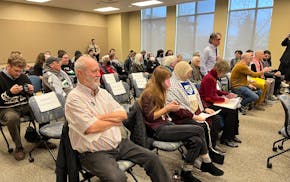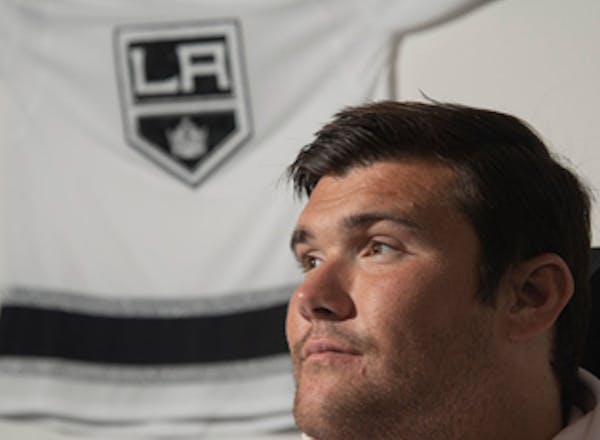Jack Jablonski was going on a date.
It was summer and he was back in Minnesota for a few weeks for another fundraiser for the foundation that bears his name. The 26-year-old opened an app, swiped and found a guy he liked and who liked him.
And then he canceled.
"What if someone sees you?" his family worried.
Paralyzed at a high school hockey game in 2011, he had been a source of inspirational, feel-good news stories. He was the kid who turned a devastating sports injury into a force for good in the world. The Jack Jablonski Foundation has raised millions of dollars for spinal cord injury research. He had a great job with the NHL.
But he wasn't out yet. What if someone told the world he was gay before he was ready to share the news himself?
Coming out doesn't change who you are. But it can change how the world treats you.
Which is why coming-out announcements, like Jablonski's last month, still matter.
It matters to kids like the ones KQ Quinn works with as a school equity coordinator for OutFront Minnesota.
Quinn offers coming-out training for youngsters who are almost ready to tell their parents or friends or teachers that they're gay, or trans, or ready to use the pronouns that make them feel more like themselves.
They talk about what they'll say, how they'll answer questions, where they can go for support if they don't find support at home. Being kind when someone comes out is more than just Minnesota Nice. It's a lifeline. A 2022 survey by the Trevor Project found that 45% of LGBTQ youth have seriously considered suicide in the past year.
So if someone comes out to you, say thank you.
"This person just shared some really, really important and vulnerable information," said Quinn, who uses they/them pronouns. "I always recommend starting with 'Thank you very much for sharing that with me' … 'What do you need in this moment and what do you need moving forward so I can show that I support you and love you?' "
Jablonski came out on his own terms, in his own words, and so far the response has been overwhelmingly – 99%, he estimates – positive.
"Now I can just be myself," he said. "I don't have to worry about living in the shadows … Embrace who you are. This is the only life you're promised."
The Jack Jablonski Foundation is hosting its big Beat Paralysis Gala on Oct. 15 in St. Paul, which will raise money for two spinal cord research projects. Over the years, the foundation has raised $3 million, bringing hope to an injury the Jablonski family never saw as hopeless.
"Slowly but surely, progress," Jablonski tweeted in March. Below the words, a video showed him pouring water out of a bottle and into a glass — an action that would have been unthinkable before his participation in an upper-limb stimulation research trial.
By July, a follow-up video captured the moment he swiped a cracker through some hummus and popped it in his mouth. A tiny, everyday gesture. An enormous triumph.
"Hard work is paying off!" he tweeted. "Couldn't control my hands like this six months ago. Finally able to eat lunch on my own."
He will walk again someday, he believes. Someday, he'll skate again.
Right now, he's just happy to be living without fear of what might happen if somebody spots him out on a date.
"It's great to be who you are," he said. "I just want everyone to be who they are and not have to hide and live a lie."
Now that he's out, the most intrusive questions he's likely to face at the Oct. 15 gala will be whether he'll be rooting for the Minnesota Wild when they play his employers – the L.A. Kings – in St. Paul that night.
Jablonski, a Minnesota story of courage and optimism for the past decade, just added another chapter.
"It was scary," he said. "But I'm so happy I've done it. I'm happy to be who I am."

Brooks: Make America Great Again, meet 'beggar thy neighbor'

Brooks: St. Paul's Lowertown has everything — except the foot traffic its businesses rely on

Brooks: Taking down Tesla

Brooks: Nothing makes a downtown more vibrant than forcing people to be there


